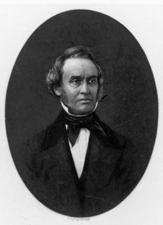Robert Rantoul
| Robert Rantoul Jr. | |
|---|---|
 |
|
|
United States Senator from Massachusetts |
|
|
In office February 1, 1851 – March 4, 1851 |
|
| Preceded by | Robert C. Winthrop |
| Succeeded by | Charles Sumner |
| Member of the U.S. House of Representatives from Massachusetts's 2nd district |
|
|
In office March 4, 1851 – August 7, 1852 |
|
| Preceded by | Daniel P. King |
| Succeeded by | Francis B. Fay |
| United States Attorney for the District of Massachusetts | |
|
In office 1846–1849 |
|
| Preceded by | Franklin Dexter |
| Succeeded by | George Lunt |
| Member of the Massachusetts House of Representatives | |
|
In office 1835-1839 |
|
| Personal details | |
| Born |
August 5, 1805 Beverly, Massachusetts |
| Died | August 7, 1852 (aged 47) Washington, D.C. |
| Political party | Democratic |
| Alma mater | Harvard University |
| Profession | Law |
Robert Rantoul Jr. (August 5, 1805 – August 7, 1852) was an American lawyer and politician from Massachusetts.
Rantoul was a member of the Massachusetts House of Representatives (1835–1839), the commission to revise the laws of Massachusetts, and the Massachusetts Board of Education (1837–1842). He was the United States Attorney for the District of Massachusetts (1846–1849). He was elected in 1850 to the United States House of Representatives for the 32nd Congress. Before his term there began, he was named as a Democrat to the United States Senate to fill the vacancy caused by the resignation of Robert Charles Winthrop, who had been appointed after the resignation of Daniel Webster and resigned when he failed to win election to a full term. Rantoul served in the Senate from February 1, 1851 to March 4, 1851, and then in the House from March 4, 1851, until his death. He was buried in Central Cemetery, Beverly, Massachusetts. Rantoul had a wife, Jane Elizabeth Woodbury, and two children, Robert S. Rantoul and Charles W. Rantoul.
Rantoul was born on August 5, 1805 in Beverly, Massachusetts. He was the eldest son of Robert and Joanna Lovett Rantoul. He attended the common schools and Phillips Andover Academy and graduated from Harvard University in 1826.
From his early years, Rantoul exhibited a precociousness, maturity, and love for learning that made an indelible impression on those around him. As a child, Rantoul was known for his "ingeniousness, veracity, modesty, docility, and tender conscientiousness." An extract taken from his childhood journal, written at age 8, reads: "Jan. 4, 1814. Gained the following idea, namely, that I had better sometimes be imposed upon, than never to trust."
At age 14, Rantoul enrolled at Phillips Andover Academy, where he would study under the tutelage of the famous educator John Adams. Recalling Rantoul, one Andover classmate stated: "The trait which impressed me the most, was his unquestionable thirst for knowledge, which he sought for gratification in every field of human inquiry. Whatever arrested his attention, whether it were a paper in the Spectator, a speech in Congress, a new poem in Lord Byron's, or recent invention in the arts, it absorbed all his faculties, and was thoroughly mastered and digested before he left it."
...
Wikipedia
